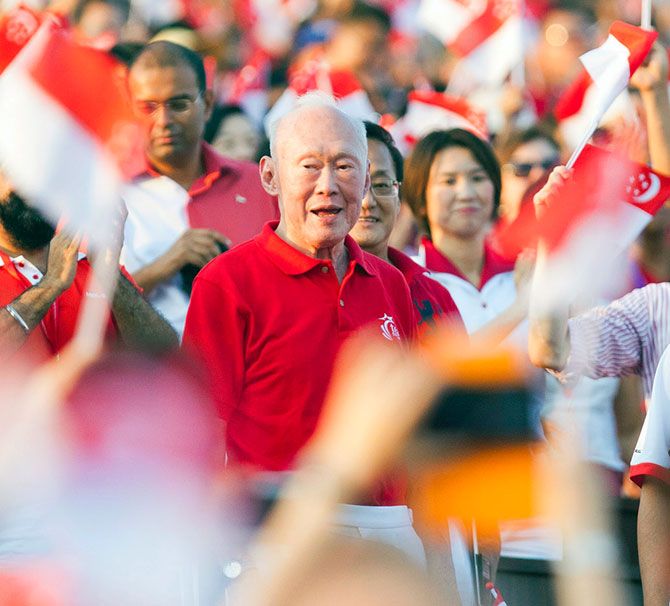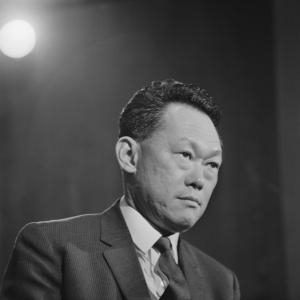'He proved that a small nation could do what even bigger nations could not think of and that was his greatest gift to the next generation,' says Tarun Vijay, MP.

He was us, in many ways. He felt the arrogance of the White racists and the pain of being colonised and decided to change the world for his people.
He was called authoritarian, but to me he always remained a determined leader, who wanted nothing except to realise the greatest dreams of his people.
He was unforgiving to wrongdoers and felt good about it. He never minced words. Bad money was bad for him. He rose so high in public esteem that his life is now a touchstone for leaders who would like to be trusted for their workmanship and people-oriented policies.
He earned so much awe and respect in his lifetime and has risen greater - even in the parts of the world he was unknown -- after his death.
No, he didn't achieve all this glory through military power, or through imposing wars on reluctant lands, or through creating a huge pile of nukes in his backyard that would make a neighbour shriek with fear.
His power was people. Singapore, a very small city State, welcomed people from every nook and corner of the world and taught them to be disciplined and dedicated to the work assigned to them.
Do what is expected of you and never try what is not expected.
He didn't allow democracy to turn into a mobocracy. Democracy can't be an alibi for backwardness and staleness. It must prove that it is the best way to serve the people.
Moreover, his life was transparent -- so difficult and seemingly almost impossible in today's public life.
Forget the statistics regarding Singapore's development indices. They mean nothing before the worldwide credibility earned under Lee Kuan Yew's leadership.
Here was a man who would prove that a small nation could do what even bigger nations in many ways could not think of and that was Lee Kuan Yew's greatest gift to the next generation.
He was hopeful of the Indian growth story and said in an interview what each one of use must ponder over.
His famous lines (external link) were: 'India has wasted decades in State planning and controls that have bogged it down in bureaucracy and corruption. A decentralised system would have allowed more centres like Bangalore and Bombay to grow and prosper... The caste system has been the enemy of meritocracy... India is a nation of unfulfilled greatness. Its potential has lain fallow, underused.'
I can't resist his views, so true and exact about our civil services still wrapped in a colonial mindset. 'The average Indian civil servant still sees himself primarily as a regulator and not as a facilitator. The average Indian bureaucrat has not yet accepted that it is not a sin to make profits and become rich. The average Indian bureaucrat has little trust in India's business community. They view Indian business people as money-grabbing opportunists who do not have the welfare of the country at heart, and all the more so if they are foreign.'
And dismissing any chances of a Sino-Indian war, he compared both giants: 'India's private sector is superior to China's... Indian companies follow international rules of corporate governance and offer a higher return on equity as against Chinese companies. And India has transparent and functioning capital markets.'
'India has a stronger banking system and capital markets than China. India has stronger institutions -- in particular, a well developed legal system which should provide a better environment for the creation and protection of intellectual property.'
'India -- with an average age of 26, compared to China's 33, and with much faster population growth -- will enjoy a bigger demographic dividend, but it will have to educate its people better, or else, the opportunity will turn into a burden.'
Lee Kuan Yew's legacy will be difficult to follow. But why should it be followed at all? It should be bettered for mankind if we are sincere in paying homage to the great statesman.
For us Indians, it will be achieved through making India a greater, happier and powerful nation, not to subjugate or be overawed by others, but to extinguish the smokes of war, hate and barbarism of extremism.
A stronger India is what can be our best tribute to Lee Kuan Yew.
And lastly, there is no alternative to dedication for the good of your people. These lines by him should be put at the bedside of each of our leaders:
'Even from my sickbed, even if you are going to lower me to the grave and I feel that something is going wrong, I will get up.'
It is no surprise that when a great opportunity arose before us Indians to achieve what seems impossible, we all loved to compare Narendra Modi with Lee Kuan Yew!
Tarun Vijay is a BJP Member of the Rajya Sabha.
Image: Crowd cheers as Singapore's former prime minister Lee Kuan Yew arrives for the annual National Day Parade celebrations in Singapore, August 9, 2012. Photograph: Calvin Wong/Reuters

.jpg)







